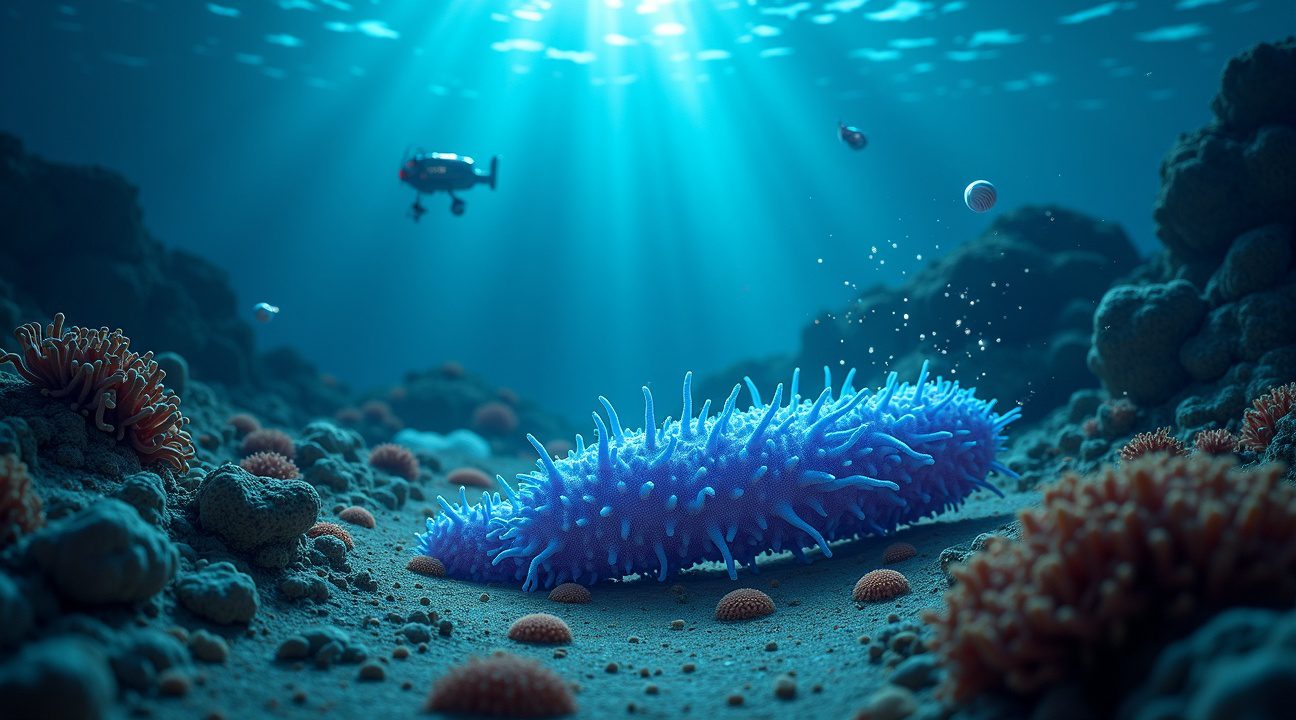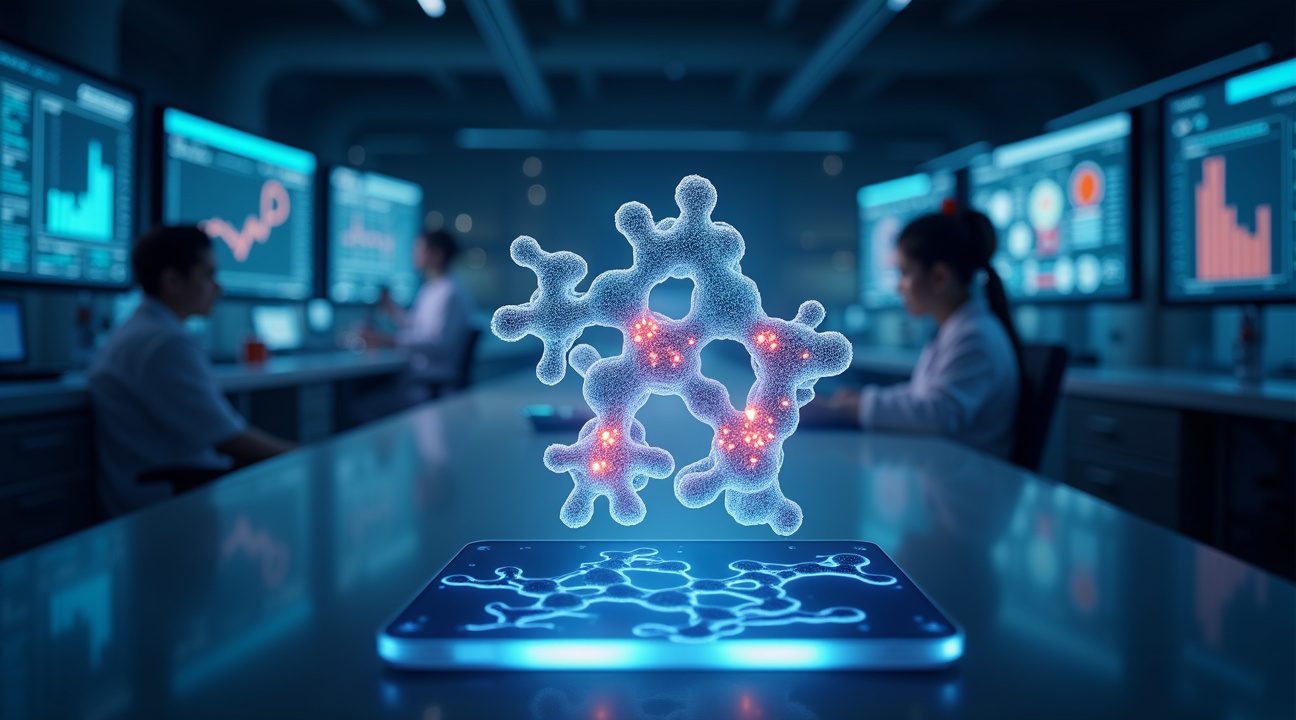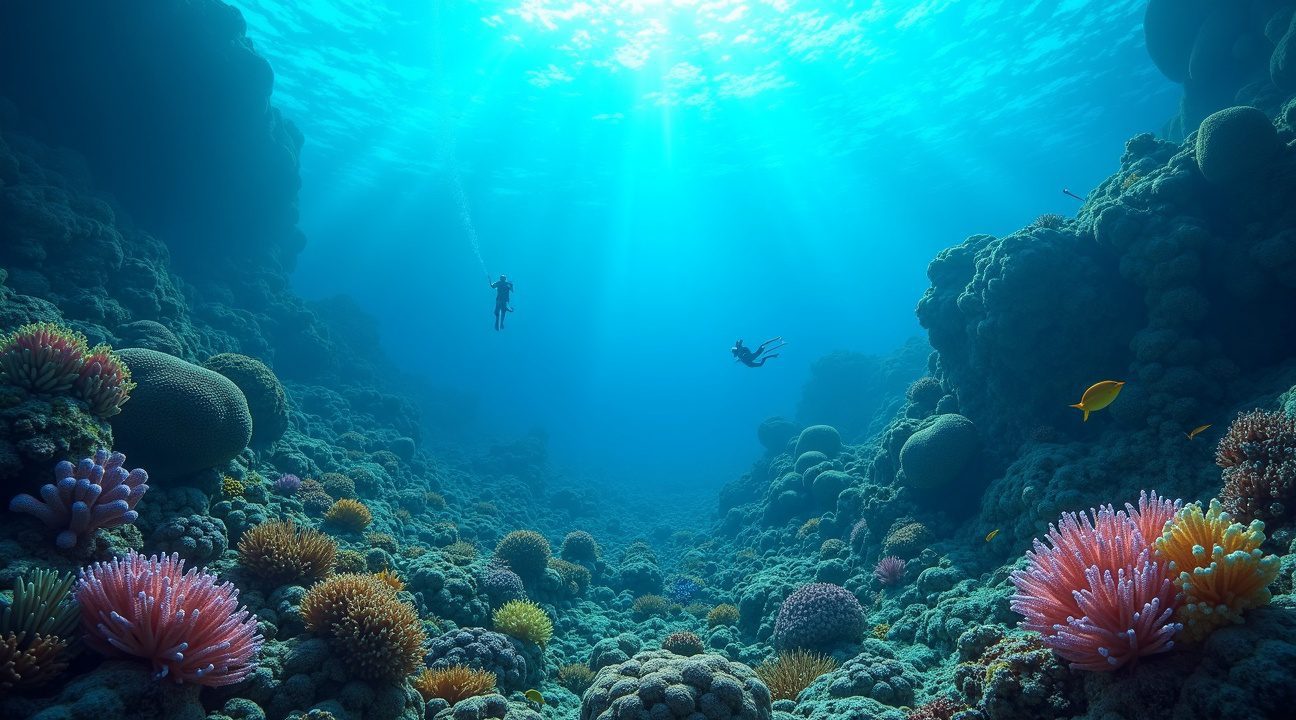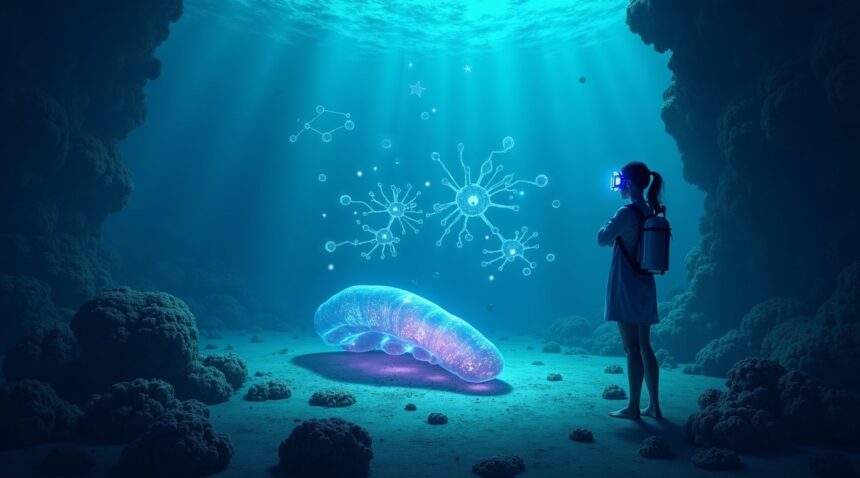Scientists at the University of Mississippi have uncovered a potent cancer-fighting sugar compound called fucosylated chondroitin sulfate in Florida sea cucumbers that specifically targets cancer cells while avoiding the dangerous side effects of traditional chemotherapy.
This breakthrough research, published in Glycobiology journal, reveals how this natural marine compound blocks the Sulf-2 enzyme that drives cancer growth and metastasis across multiple cancer types.
Key Takeaways
- The sea cucumber compound targets the Sulf-2 enzyme that promotes cancer growth in breast, lung, pancreatic, head and neck, hepatocellular carcinoma, and gastric cancers.
- Unlike chemotherapy, this natural sugar specifically attacks cancer cells while leaving healthy tissue unharmed and avoiding blood clotting complications.
- Laboratory tests show superior performance of the marine compound compared to existing treatments, with a better safety profile than conventional therapies.
- Sea cucumbers offer a novel class of therapeutic compounds that function through unique mechanisms, distinct from traditional pharmaceuticals.
- Overharvesting threatens sea cucumber populations worldwide, potentially affecting future accessibility to these medical resources.
Targeting the Sulf-2 Enzyme
The Sulf-2 enzyme plays a crucial role in cancer progression by modifying cell surface structures that influence how cancer cells grow, metastasize, and resist treatment. By blocking Sulf-2, the sea cucumber compound disrupts key biological pathways that tumors rely on.
Precision Without the Side Effects
This discovery marks a turning point in cancer treatment strategy. Traditional chemotherapy indiscriminately attacks healthy and unhealthy cells, leading to debilitating side effects. The sea cucumber-derived compound demonstrates remarkable specificity, selectively targeting malignant cells while sparing healthy tissue.
Laboratory Breakthroughs Against Aggressive Cancers
Studies conducted in laboratory settings have shown measurable tumor reduction across six different cancer types. Especially encouraging was its effect on pancreatic cancer, one of the most treatment-resistant forms. The compound consistently reduced tumor growth with minimal toxicity.
Nature’s Evolutionary Defense Harnessed for Medicine
Florida sea cucumbers naturally produce this sugar compound as a defense mechanism against predators and environmental threats. Researchers believe this adaptation led to the evolution of a molecule uniquely suited to attack specific cancer-promoting enzymes in humans.
Superior Safety Profile
The marine compound’s safety distinguishes it from many existing cancer medications. Chemotherapy frequently brings harsh side effects such as immune system suppression, hair loss, and organ damage. Preliminary results from laboratory testing suggest this compound maintains anti-cancer effectiveness without these complications.
Conservation Challenges
Overharvesting remains a pressing concern. Sea cucumbers are slow to mature, and intensive harvesting has reduced their populations in many ocean regions. Sustainable harvesting and aquaculture programs are vital for preserving their availability for scientific research and potential medical use.
The Path Toward Synthetic Production
To reduce environmental pressure and assure stable access, researchers are exploring ways to synthetically produce the compound. Laboratory synthesis would allow large-scale production and possibly enable chemical enhancements to increase effectiveness or minimize any residual side effects.
New Frontiers in Cancer Therapy
This natural sugar compound holds promise for combination therapies. Its unique mode of action could improve the efficacy of immunotherapy or targeted medications when used together, especially in hard-to-treat cancers. This discovery introduces a viable candidate for inclusion in next-generation, precision oncology treatments.
Advancing to Clinical Trials
The next step is rigorous human testing. Clinical trials will determine optimal dosing, the most responsive cancer types, and the extent of its safety in human subjects. Success in clinical application would mark a revolutionary shift toward non-toxic, natural anti-cancer agents.
The Value of Marine Medicine
Marine organisms remain an underexplored source of healing compounds. This finding reaffirms the importance of ocean biodiversity for both environmental balance and breakthrough biomedical discoveries.
Breakthrough University Study Reveals Ocean-Dwelling Creature’s Anti-Cancer Powers
I recently examined groundbreaking research from the University of Mississippi that’s reshaping how medical researchers view marine organisms as sources of life-saving treatments. The study, published in Glycobiology journal in June 2025, spotlights a remarkable discovery within the humble Florida sea cucumber that could transform cancer therapy approaches.
Marwa Farrag, a fourth-year doctoral candidate in BioMolecular Sciences, spearheaded this collaborative effort between the University of Mississippi and Georgetown University. Her team’s investigation focused on Holothuria floridana, the scientific name for the Florida sea cucumber, an unassuming creature that harbors extraordinary therapeutic potential.
The Sugar Molecule Making Waves in Cancer Research
The research centers on fucosylated chondroitin sulfate, a specialized sugar molecule that exhibits powerful anti-cancer properties. This compound belongs to a larger family called glycosaminoglycans, which are complex carbohydrates that play crucial roles in cellular processes. What makes this discovery particularly exciting is how this naturally occurring sugar demonstrates specific mechanisms that target cancer cells while potentially sparing healthy tissue.
The collaborative nature of this research demonstrates the growing recognition that marine environments contain untapped pharmaceutical treasures. Scientists are increasingly turning their attention to ocean-dwelling creatures, recognizing that millions of years of evolution have produced sophisticated biochemical defenses that could benefit human health.
This finding represents more than an isolated discovery – it highlights the broader significance of marine compounds in advancing medical research and drug development. The ocean covers over 70% of Earth’s surface, yet researchers have barely scratched the surface of its therapeutic potential. Studies like this one from deep-sea exploration continue to reveal new possibilities for medical breakthroughs.
The fucosylated chondroitin sulfate found in these sea cucumbers offers several advantages over synthetic alternatives:
- Better biocompatibility: Natural compounds are typically more easily accepted by the human body.
- Fewer side effects: Compared to synthetic drugs, natural molecules often cause less harm to surrounding tissues.
- Multi-pathway action: The complex structure means the compound could work against multiple cancer types through various biological pathways.
Farrag’s research team employed advanced analytical techniques to isolate and characterize this compound, ensuring they understood its precise molecular structure and biological activity. Their methodology provides a foundation for future studies that could lead to clinical trials and eventual therapeutic applications.
The implications extend beyond cancer treatment. Glycosaminoglycans like the one discovered in Florida sea cucumbers have shown promise in treating inflammatory conditions, cardiovascular disease, and age-related disorders. This versatility makes the compound particularly valuable for pharmaceutical development, as researchers can explore multiple therapeutic applications from a single natural source.

How the Sea Cucumber Compound Blocks Cancer’s Spread at the Cellular Level
The fucosylated chondroitin sulfate compound extracted from sea cucumbers targets cancer through a precise biological mechanism. This natural substance works by blocking Sulf-2, a critical enzyme that researchers have identified as a major driver of cancer growth and metastasis across multiple cancer types.
Targeting the Sulf-2 Enzyme
Sulf-2 plays a destructive role in various cancers, including breast, lung, pancreatic, head and neck, hepatocellular carcinoma, and gastric cancer. Researchers have found that this enzyme essentially creates favorable conditions for cancer cells to multiply and spread throughout the body. The sea cucumber compound acts as a competitive inhibitor, meaning it competes with natural substrates for the same binding site on the Sulf-2 enzyme, effectively neutralizing its cancer-promoting effects.
What makes this discovery particularly promising is the compound’s safety profile. Unlike some conventional treatments that can trigger dangerous blood clotting complications, the sea cucumber-derived substance doesn’t carry this risk. Laboratory tests combined with advanced computer modeling have consistently demonstrated the compound’s effectiveness against Sulf-2, providing researchers with confidence in its therapeutic potential.
Cellular Communication and Immune Response Benefits
The compound’s anti-cancer properties extend beyond simply blocking Sulf-2. Researchers discovered that even smaller fragments of the original compound maintain their cancer-fighting abilities while potentially offering additional advantages. These fragments can modify glycans, which are essential molecular structures that facilitate cell communication and coordinate immune responses.
This glycan modification capability opens up exciting possibilities for enhancing the body’s natural defense mechanisms against cancer. By improving cellular communication pathways, the compound may help immune cells better recognize and attack cancerous tissue. The ability to use smaller fragments also suggests that scientists could develop more targeted treatments with reduced side effects compared to using the full compound.
The consistency between laboratory results and computer modeling predictions strengthens the scientific foundation for this discovery. This dual validation approach helps ensure that the observed effects aren’t simply laboratory artifacts but represent genuine biological activity that could translate into clinical applications. Research finds in marine environments continue to yield surprising medical breakthroughs, highlighting the ocean’s untapped therapeutic potential.

Safer Cancer Treatment Without Chemotherapy’s Devastating Side Effects
Traditional chemotherapy operates like a blunt instrument, attacking both cancerous and healthy cells throughout the body. This indiscriminate approach often leaves patients weakened and vulnerable to severe complications. I’ve observed how conventional treatments frequently cause debilitating side effects that can be as challenging as the cancer itself.
The sea cucumber compound represents a revolutionary shift in cancer treatment strategy. This natural sugar demonstrates remarkable precision, specifically targeting malignant cells while leaving healthy tissue largely untouched. Such selectivity could transform how we approach cancer therapy, moving away from the destructive patterns that characterize current treatments.
Eliminating Blood Clotting Risks
One of the most significant advantages of this discovery lies in its ability to avoid dangerous blood clotting complications. Current chemotherapy drugs often trigger thrombotic events that can prove fatal to patients already fighting for their lives. The sea cucumber compound sidesteps this critical safety concern entirely, offering a treatment path that doesn’t compromise cardiovascular health.
Active individuals and athletes stand to benefit considerably from this targeted approach. The compound’s anti-inflammatory properties could support faster recovery times while maintaining the body’s natural healing processes. Unlike traditional treatments that often force patients into extended periods of weakness and inactivity, this natural alternative might allow people to maintain their physical routines during treatment.
Laboratory testing has revealed particularly encouraging results. The sea cucumber compound actually outperformed existing treatment options in controlled studies, demonstrating superior cancer-fighting capabilities without the accompanying toxicity. These findings suggest we’re looking at a potential game-changer in oncology.
The precision of this natural compound addresses one of medicine’s greatest challenges in cancer treatment. By specifically targeting malignant cells, it preserves the immune system’s strength and maintains the body’s ability to heal itself. This selective action could mean patients experience treatment without the crushing fatigue, nausea, and immune suppression that typically accompany chemotherapy.
For healthcare providers, this development offers hope for a treatment modality that doesn’t require patients to choose between fighting cancer and maintaining quality of life. The compound’s natural origin also suggests fewer synthetic complications and drug interactions, potentially simplifying treatment protocols.
The implications extend beyond immediate treatment benefits. Patients might maintain better nutritional status, preserve muscle mass, and avoid the cognitive impairment often associated with traditional chemotherapy. This could mean returning to normal life activities much sooner than current treatments allow.
Why Ocean Janitors May Hold the Key to Revolutionary Medicine
I find it fascinating that over 1,000 species of sea cucumbers crawl across seafloors around the globe, earning their reputation as the ocean’s janitors through their constant cleaning of the seabed and recycling of essential nutrients. These unassuming creatures spend their days filtering sediment and organic matter, maintaining the delicate balance of marine ecosystems while harboring secrets that could transform modern medicine.
Sea cucumbers and other marine organisms produce bioactive compounds with unique molecular structures rarely found in land-based vertebrates. This evolutionary divergence has created a treasure trove of chemical diversity that scientists are only beginning to understand. The isolation of marine environments has allowed these creatures to develop specialized biochemical pathways that differ dramatically from those found in terrestrial life forms.
A New Class of Therapeutic Compounds
The sugar-based compounds discovered in sea cucumbers belong to a class of molecules known as glycosaminoglycans. These complex carbohydrates represent a significant departure from traditional pharmaceutical approaches. While most medications work by blocking or competing with specific molecular targets, the compounds found in sea cucumbers operate through an entirely different mechanism.
I’m particularly intrigued by how these compounds differ from existing medical treatments because they alter the entire operation of enzymes like Sulf-2, rather than competing directly with other molecules in a conventional way. This approach represents a paradigm shift in therapeutic strategy. Instead of simply blocking a pathway or receptor, these marine-derived compounds fundamentally change how cellular machinery functions.
This distinct mechanism of action opens new avenues for therapy and demonstrates the untapped potential of marine biodiversity in medicine. The implications extend far beyond cancer treatment, suggesting that ocean-dwelling creatures may hold solutions to numerous medical challenges that have puzzled researchers for decades. Marine research continues to reveal the extraordinary biochemical diversity hidden beneath the waves.
The discovery challenges conventional pharmaceutical development, which has historically focused on modifying existing compounds or creating synthetic alternatives to known biological molecules. Sea cucumbers offer something entirely different – evolutionary solutions that emerged over millions of years of marine adaptation. Their glycosaminoglycans represent sophisticated molecular tools that could revolutionize how doctors approach disease treatment.
These findings highlight the critical importance of marine conservation efforts. Each species lost to environmental degradation potentially represents the disappearance of unique biochemical innovations that could benefit human health. The ocean’s janitors may seem insignificant as they quietly maintain seafloor ecosystems, but their molecular machinery could hold keys to medical breakthroughs that save countless lives.
The research also underscores how much scientists still don’t know about marine biochemistry. Despite decades of ocean exploration, the vast majority of marine species remain unstudied from a pharmaceutical perspective. Sea cucumbers alone encompass over 1,000 species, each potentially harboring distinct molecular innovations shaped by their specific environmental niches and evolutionary pressures.
Moving forward, this discovery will likely accelerate bioprospecting efforts in marine environments. Pharmaceutical companies and research institutions are beginning to recognize that the ocean represents an largely untapped pharmacy, filled with compounds that evolution has refined over geological timescales. The humble sea cucumber, quietly filtering sediment on distant seafloors, may have just opened the door to an entirely new era of medicine based on marine-derived therapeutics.

Scientific Validation Through Advanced Laboratory and Computer Testing
Researchers validated their groundbreaking discovery through comprehensive laboratory experiments combined with sophisticated computer modeling techniques. The advanced simulations provided crucial insights into how the sea cucumber compound interacts with the Sulf-2 enzyme at the molecular level. This dual approach revealed the precise binding regions where the natural sugar attaches to its target, offering scientists a detailed roadmap of the cancer-fighting mechanism.
Computer modeling played a particularly important role in understanding the compound’s effectiveness. The simulations demonstrated exactly how the sea cucumber extract binds to vital regions of the Sulf-2 enzyme, effectively disrupting its role in cancer progression. This molecular-level analysis showed that the natural sugar doesn’t just randomly interfere with cancer processes—it targets specific sites with remarkable precision.
Comparative Analysis Confirms Superior Performance
Scientists conducted extensive comparative studies to evaluate various ocean-derived substances against the sea cucumber extract. The testing revealed several key advantages:
- The sea cucumber compound consistently outperformed other marine-based extracts in binding efficiency
- Its unique molecular structure demonstrated superior stability under laboratory conditions
- The natural sugar showed optimal interaction patterns with Sulf-2 enzyme binding sites
- Comparative effectiveness measurements placed it significantly ahead of alternative compounds
Laboratory analyses confirmed what the computer models predicted about the compound’s stability and effectiveness. The natural sugar maintained its cancer-fighting properties across multiple testing conditions, proving its reliability for potential drug development. Both computational and experimental data aligned perfectly, creating a compelling scientific foundation for advancing this discovery.
The validation process established that this sea cucumber-derived compound possesses the ideal characteristics needed for pharmaceutical development. Its stable molecular structure, combined with its precise targeting ability, makes it an exceptional candidate for further research. Scientists now have solid evidence supporting the compound’s potential as a natural cancer-fighting agent, backed by both virtual simulations and real-world laboratory testing.
This comprehensive validation approach ensures that researchers can move forward with confidence. The combination of computer modeling and laboratory verification provides the scientific community with reliable data about the compound’s mechanism of action and effectiveness against cancer-related enzymes.

Ocean Medicine’s Promise Threatened by Overharvesting Crisis
The ocean’s vast depths have long held untapped pharmaceutical potential, yet scientific exploration has faced significant barriers due to the challenging nature of marine research. Deep-sea environments remain largely inaccessible, limiting researchers’ ability to study and harvest promising bioactive compounds from marine organisms. This accessibility challenge has historically slowed the pace of marine drug discovery, leaving countless therapeutic possibilities unexplored beneath the waves.
The Sea Cucumber Depletion Crisis
Commercial fishing operations have dramatically reduced sea cucumber populations since the latter half of the 20th century. These marine creatures face intense harvesting pressure driven by both traditional medicine markets and culinary demand. The rapid decline in sea cucumber numbers directly threatens the availability of the newly discovered cancer-fighting compounds for future research and development.
Overharvesting creates a cascade of problems that extend far beyond pharmaceutical research. Sea cucumbers serve as critical ecosystem engineers, constantly filtering sediment and organic matter from the ocean floor. Their feeding activities help maintain water quality and support healthy marine environments. When these populations collapse, entire seafloor ecosystems suffer from reduced filtration and waste processing.
Ecosystem Disruption and Coral Reef Protection
Sea cucumbers provide essential protection services for coral reefs by consuming bacteria and organic waste that could otherwise lead to coral disease outbreaks. Their absence leaves coral systems vulnerable to pathogenic infections and environmental stress. This relationship demonstrates how the loss of sea cucumber populations affects marine biodiversity on multiple levels.
The newly identified cancer-fighting sugar compound represents just one example of the pharmaceutical treasures hidden within marine ecosystems. Scientists believe this discovery could serve as a blueprint for developing entirely new classes of cancer treatments. However, continued access to these compounds depends entirely on maintaining healthy sea cucumber populations in their natural habitats.
Protecting marine biodiversity has become essential for advancing medical research in this field. Conservation efforts must balance the immediate need for research specimens with long-term sustainability goals. Without proper management of sea cucumber harvesting, future generations may lose access to these potentially life-saving compounds before scientists can fully understand their therapeutic applications.
The race between scientific discovery and species depletion highlights a critical challenge facing marine pharmaceutical research. Sustainable harvesting practices and habitat protection measures will determine whether the ocean’s medical promise can be realized or will remain forever lost to overharvesting.

Sources:
Sports Illustrated: “The Surprising Ocean Superfood That Could Help Fight Cancer”
Economic Times: “Scientists have found a breakthrough in cancer treatment, and it is deep within the ocean”
University of Mississippi News: “Sea Cucumbers Could Hold Key to Stopping Cancer Spread”
Science Daily: “Scientists discover natural cancer-fighting sugar in sea cucumbers”
Study Finds: “How This Slimy Sea Creature Could Revolutionize Cancer Treatments”
Discover Magazine: “Sea Cucumbers Could Be the Key to Stopping Cancer Growth With a Rare Sugar”


